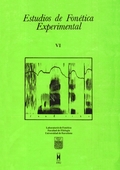Comprensión rítmica en el español caribeño: habla espontánea
Abstract
This paper reports findings of temporal compression through the acoustic analysis of spontaneous speech in a dialect of Caribbean Venezuelan Spanish. The materials were emitted by a female speaker of a low sociolectal level in an interview dialogue. The corpus was segmented in three prosodic and hierarchical levels: syllables within rhythmic groups embedded in intonational phrases. Measurements on duration of the emissions were taken from oscillographic traces and spectrograms. Results indicated a similar temporal pattern: low degree of compression in pre-stress syllables and degrees of deceleration in stressed syllables or in post-stress syllables, a compensatory effect. In addition, rhythmic group-boundary syllables were longer and intonational phrase-boundary syllables were the longest. The findings suggest a tendency to syllable-timing in pre-stress positions and a strong effect of final lengthening from the stress.
Downloads
Published
How to Cite
Issue
Section
License

This work is licensed under a Creative Commons Attribution-NonCommercial-NoDerivatives 4.0 International License.
All articles published online by Estudios de Fonética Experimental are licensed under Creative Commons Attribution-NonCommercial-NoDerivs 4.0 International (CC BY-NC-ND 4.0 DEED), unless otherwise noted. Estudios de Fonética Experimental is an open access journal. Estudios de Fonética Experimental is hosted by RCUB (Revistes Científiques de la Universitat de Barcelona), powered by Open Journal Systems (OJS) software. The copyright is not transferred to the journal: authors hold the copyright and publishing rights without restrictions. The author is free to use and distribute pre and post-prints versions of his/her article. However, preprint versions are regarded as a work-in-progress version used as internal communication with the authors, and we prefer to share postprint versions.




